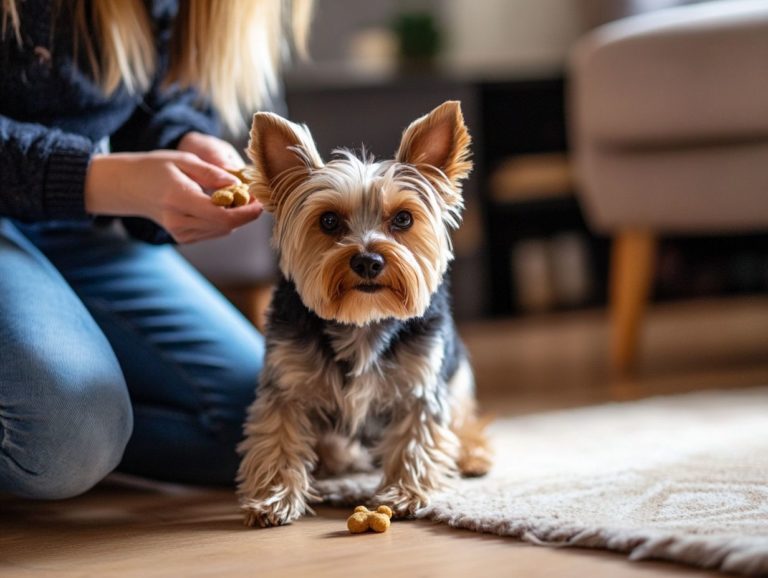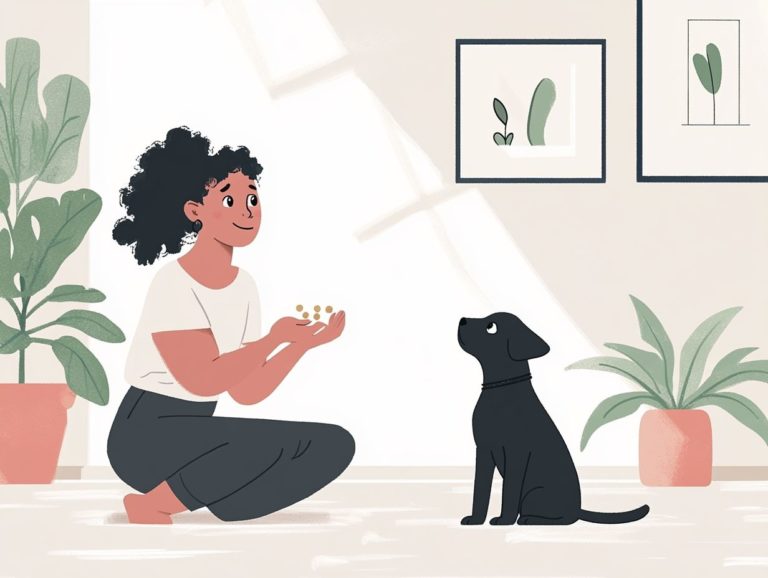5 Signs Your Pet Needs Specialized Training
Is your furry companion acting out? Whether it s aggression toward people or other animals, anxiety in specific situations, or difficulty learning basic commands, these signs suggest your pet might benefit from custom training.
Grasping these behaviors is essential for both their well-being and your peace of mind.
This article delves into five key indicators that your pet needs specialized attention, highlights the benefits of training, and offers tips for selecting the right trainer.
Explore these insights to deepen your bond and elevate your pet s behavior!
Contents
- Key Takeaways:
- 1. Your Pet Is Aggressive Towards People or Other Animals
- 2. Your Pet Is Fearful or Anxious in Certain Situations
- 3. Your Pet Has Destructive Behaviors
- 4. Your Pet Has Difficulty with Basic Commands
- 5. Your Pet Is Exhibiting Unusual Behaviors
- What Is Specialized Training for Pets?
- Frequently Asked Questions
- What are the most common signs that my pet needs specialized training?
- How can specialized training benefit my pet’s behavior?
- Can any type of pet benefit from specialized training?
- How can I find a qualified trainer for my pet’s specialized training?
- What should I expect during my pet’s specialized training sessions?
- Is specialized training expensive?
Key Takeaways:
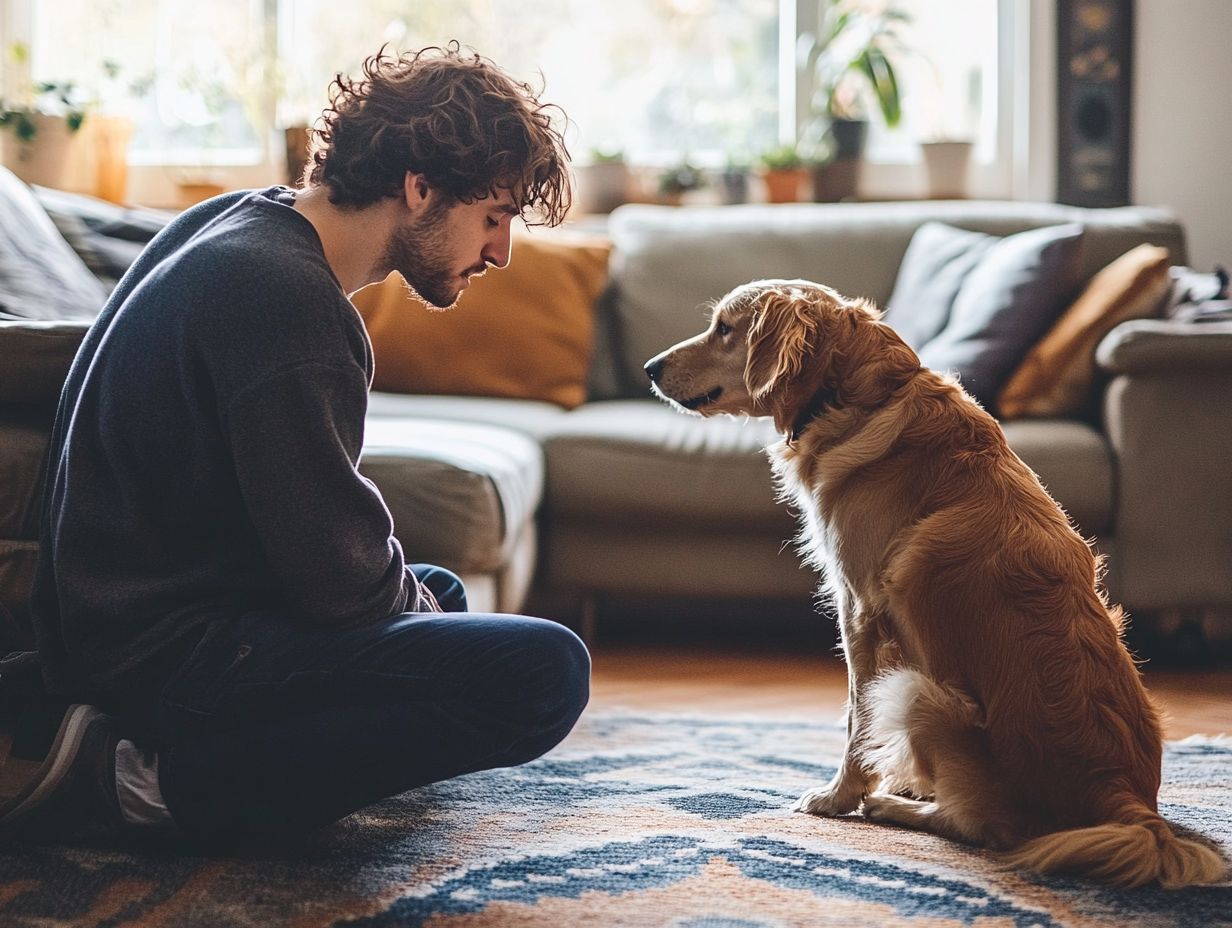
- Specialized training can help address aggression in pets toward people or other animals, providing a safer and happier environment for all.
- If your pet is showing fearful or anxious behavior, training can help them learn coping mechanisms and build confidence.
- Destructive behaviors such as chewing or scratching can be redirected through training, saving your belongings and promoting positive behavior.
1. Your Pet Is Aggressive Towards People or Other Animals
Aggressive behavior in pets can be a serious concern. It often leads to negative interactions with people and other animals, creating safety issues and emotional distress. To effectively tackle these behavioral problems, it’s essential to understand the underlying causes of aggression, like fear, protectiveness over their space, or a lack of socialization. Addressing these issues through structured dog training and effective communication techniques is crucial.
You might notice aggressive behaviors manifesting in various ways, such as barking, lunging, or growling when your dog feels threatened. These reactions often arise from specific triggers like unfamiliar environments or encounters with other animals.
Engaging with professional trainers, such as those at The Dog Wizard or Chomps Dog Training, can be invaluable. They utilize tailored obedience training and socialization exercises to help your dog learn appropriate responses in diverse situations.
Establishing clear communication between you and your dog is vital. It helps your pet understand your expectations and fosters trust. This collaborative effort can significantly reduce aggressive tendencies and cultivate a harmonious relationship between you and your furry friend.
2. Your Pet Is Fearful or Anxious in Certain Situations
Fear and anxiety in pets can show up in various ways:
- Barking
- Hiding
- Displaying aggression
These behaviors signal underlying communication issues that require your attention for the well-being of both you and your pet. Such behaviors frequently arise when your pet gets upset when you leave, leading to destructive actions that can be frustrating for everyone involved. Recognizing these signs is essential for nurturing a healthy relationship.
By incorporating positive interactions like rewarding calm behavior and providing mental stimulation through toys and puzzles you can create a more secure environment for your pet. This training helps them cope with their fears constructively. With consistent effort, you can achieve noticeable improvements in behavior and cultivate a stronger bond with your furry companion.
Ready to help your pet thrive? Let’s get started on finding the right training for you!
3. Your Pet Has Destructive Behaviors
Pets may chew furniture or dig due to boredom or anxiety. This highlights why it’s crucial to keep your pet mentally active!
A lack of mental engagement leads your dog to these behaviors as a way to release pent-up energy. This instinctual behavior often stems from their desire to explore or react to stressors like changes in routine or environment.
To tackle these issues, effective dog training becomes essential. Incorporating puppy training techniques that feature interactive games and obedience exercises is vital for keeping your dog mentally engaged.
Activities like agility courses or puzzle toys not only stimulate them mentally but also strengthen the bond between you and your pet, cultivating a healthier and happier companion.
4. Your Pet Has Difficulty with Basic Commands
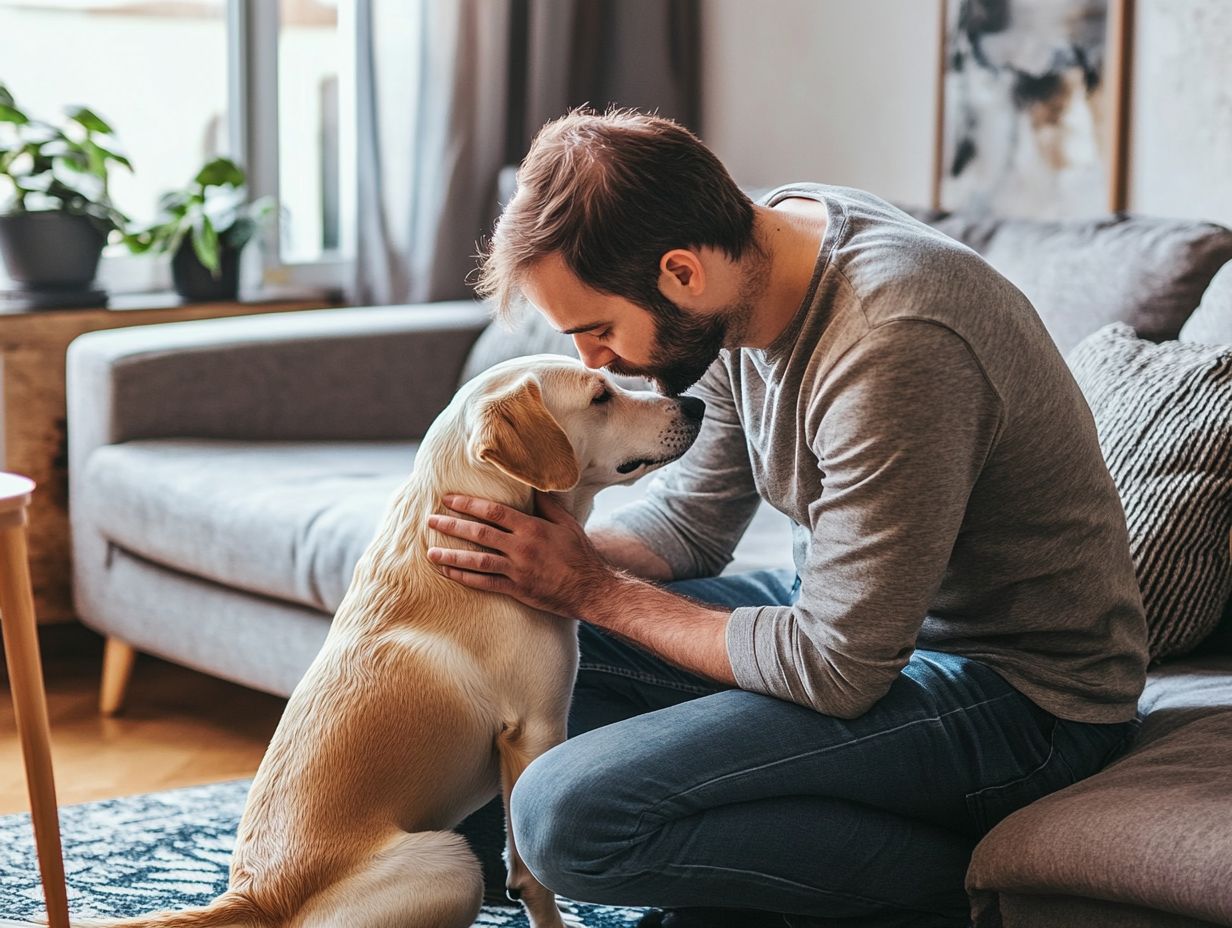
Struggling to master basic commands can be frustrating for pet owners and lead to communication hiccups. It’s essential to implement effective obedience training methods to ensure your pet behaves well.
When pets struggle to recognize commands, confusion can arise during everyday interactions, complicating walks or playtime. Establishing a solid foundation with commands like sit, stay, and come enhances safety and nurtures a harmonious relationship.
Professional trainers offer invaluable insights to help you tackle common challenges. By using rewards like treats and praise, you can significantly boost your pet’s willingness to learn, making training sessions enjoyable and fortifying your bond.
5. Your Pet Is Exhibiting Unusual Behaviors
Unusual behaviors in pets, such as excessive barking or resource guarding, can signal underlying issues that need attention. These behaviors can often be effectively addressed through engaging fun activities for dogs.
Factors like anxiety, insufficient socialization, or medical conditions can contribute to these behaviors. Don’t ignore these signs; they could lead to bigger issues later on!
Consulting a professional trainer can provide valuable insights and tailored strategies for your pet s unique needs. Participating in dog sports and scheduling regular activities enhances the bond between you and your pet, resulting in a more balanced and well-adjusted companion.
What Is Specialized Training for Pets?
Specialized training for pets involves programs tailored to specific behavioral issues, ensuring your pet receives the right guidance. This approach enhances their quality of life while fostering deeper connections with you.
This type of training uses various techniques to address unique challenges, like aggression, anxiety, or obedience. Unlike general methods that take a one-size-fits-all approach, specialized training considers your pet s personality and history.
The goal isn t just to correct disruptive behaviors; it s also to promote mutual understanding between you and your pet. Evaluating the effectiveness of training is crucial.
Professional trainers use assessments to track your pet s progress and refine strategies. By identifying specific needs, trainers can develop customized solutions that lead to lasting, positive changes in behavior.
What Are the Different Types of Specialized Training?
There are various types of specialized training available for pets, each designed to address specific needs like obedience training, socialization techniques, and puppy training. These methods are tailored to the unique challenges you and your pet may face, including leash pulling and overcoming aggressive behavior.
Behavioral modification training tackles issues such as anxiety and aggression. This involves changing a pet’s behavior through various techniques, aiding pets in adapting to different environments and stimuli. Each of these training methods employs distinct techniques. For example, positive reinforcement in obedience training encourages desired behaviors through rewards.
Socialization training exposes pets to a variety of animals and people. This significantly mitigates fear and aggression.
By implementing structured puppy training, you can establish a solid foundation. This makes it less likely for behavioral problems to arise later. Tailor these training methods to your pet’s unique challenges for better results. This will help you create a harmonious household and enhance the overall well-being of your furry companion.
How Can Specialized Training Benefit Your Pet?

Specialized training offers a wealth of benefits for your pet, ranging from improved behavior to enhanced communication between you and your furry friend. This training helps develop essential skills that can significantly diminish behavioral issues.
With specialized training, you’ll likely notice a remarkable boost in your companion’s obedience. This makes daily routines smoother and outings safer. Pets that undergo this type of training often experience reduced anxiety levels as they become accustomed to commands and routines. This, in turn, builds their confidence in various environments.
The socialization aspect is crucial; engaged pets learn to interact positively with other animals and people. This minimizes the chances of aggressive or fearful behaviors.
For example, practicing basic commands in a park not only sharpens your pet’s skills but also strengthens the emotional bond between you both. This fosters trust and understanding in your shared experiences. This practice offers your pet vital mental stimulation, keeping them sharp and engaged!
What Are the Qualifications of a Specialized Trainer?
A qualified specialized trainer possesses an in-depth understanding of canine behavior and effective training methods. They also have the ability to assess and address your pet’s individual needs. This expertise ensures a successful training process for your beloved companion.
Beyond this foundational knowledge, it’s essential for them to have relevant educational credentials, such as a degree in animal behavior or a related field. Certifications from reputable organizations that validate their skills are also important. Practical experience is just as crucial; it enables trainers to apply theoretical concepts in real-world situations, enhancing their troubleshooting abilities and adaptability.
A trainer who is well-versed in a variety of techniques from positive reinforcement to behavioral modification can tailor their approach to meet the unique challenges each dog presents. This personalized strategy leads to more effective and humane training outcomes, ultimately benefiting both you and your furry friend.
How Long Does It Take to See Results from Specialized Training?
The time it takes to see results from specialized training can vary based on your pet’s individual needs, the severity of any behavioral issues, and how consistently you or a professional trainer apply the training methods.
Several key factors influence the timeline for observable changes. Your dog’s age plays a significant role in how quickly they adapt to new commands or behaviors. Younger dogs often learn more swiftly due to their natural curiosity and eagerness to please.
Prior training experience can speed up the process. However, it may also present challenges if outdated techniques were used.
Your dedication and commitment to regular practice are crucial. The more you engage with exercises and reinforce good behavior, the faster you can achieve progress.
Generally, you might expect to see improvements in basic obedience skills within a few weeks. On the other hand, more complex changes in behavior could take several months. To maintain this progress, establish a routine and integrate training seamlessly into your everyday activities.
What Are Some Tips for Choosing the Right Specialized Trainer for Your Pet?
Choosing the right specialized trainer for your pet is essential for effective training outcomes. It requires thoughtful consideration of the trainer’s qualifications, methods, and your pet’s unique needs.
Before settling on a trainer, inquire about their philosophy regarding animal behavior and training techniques. This discussion helps determine if their approach aligns with your pet’s specific quirks and challenges.
Observing training sessions gives you insight into the trainer s style and how they interact with animals. Seeking reviews and testimonials from fellow pet owners will provide a broader perspective on the trainer’s effectiveness in addressing various behavioral issues.
Ensuring compatibility between the trainer’s methods and your pet’s personality significantly enriches the learning experience, fostering clear communication and mutual understanding.
Frequently Asked Questions
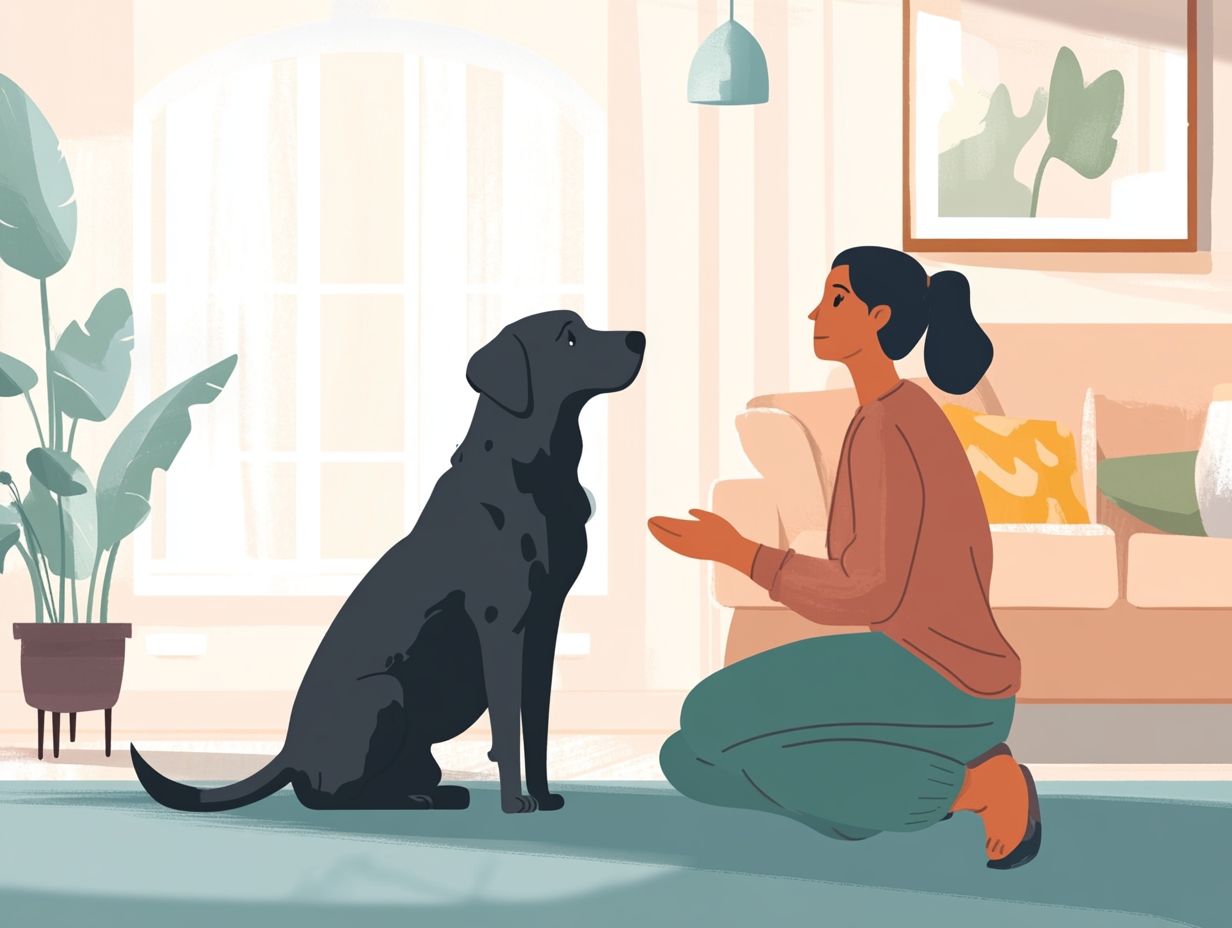
What are the most common signs that my pet needs specialized training?
The most common signs that your pet needs specialized training include excessive barking, destructive behavior, aggressive behavior towards people or other animals, difficulty following commands, and fear or anxiety in certain situations.
How can specialized training benefit my pet’s behavior?
Specialized training addresses specific behavioral issues your pet may face. Trainers work with your pet to understand their behavior and provide techniques and strategies to improve it, leading to a happier and more well-behaved pet.
Can any type of pet benefit from specialized training?
Yes, any type of pet can benefit from specialized training. Whether you have a dog, cat, bird, or even a reptile, specialized training can improve their behavior and overall well-being.
How can I find a qualified trainer for my pet’s specialized training?
Kickstart your search by asking your veterinarian or fellow pet owners for recommendations. You can also research online and read reviews to find a reputable and qualified trainer in your area.
What should I expect during my pet’s specialized training sessions?
In your pet’s training sessions, expect hands-on guidance from a trainer. You’ll work together on exercises and may even get homework to practice!
Is specialized training expensive?
The cost of specialized training varies depending on the trainer and the type of training your pet needs. However, investing in your pet’s behavioral well-being can ultimately save you money in the long run by preventing potential damages and behavior-related health issues.


